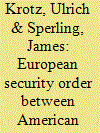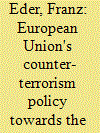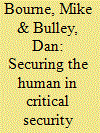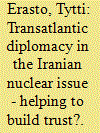| Srl | Item |
| 1 |
ID:
108665


|
|
|
|
|
| Publication |
2011.
|
| Summary/Abstract |
We investigate the impact of historically rooted domestic constructions of purpose and ambition on the patterns of discord and collaboration in the Franco-American relationship over the course of the postwar and post-cold war periods. We stress the importance and tenacity of domestic historical constructions for explaining and understanding the foreign policy strategies that would otherwise confound a power-based analysis. The Franco-American bilateral relationship, in particular, illustrates the persistence and tenacity of each nation's historically constructed foreign policy conception during the bipolar distribution of power during the cold war and the contested unipolarity of the post-cold war era. We conclude with an assessment of the salience and relevance of domestic elements of foreign policy role and purpose for explaining and understanding how their bilateral relationship has affected the European security order into the second decade of the twenty-first century.
|
|
|
|
|
|
|
|
|
|
|
|
|
|
|
|
| 2 |
ID:
108670


|
|
|
|
|
| Publication |
2011.
|
| Summary/Abstract |
This article sheds light on the European Union's counter-terrorism policy in the Maghreb taking into account the diverse influences and interests shaping its strategic thinking. To explain the complex web of opportunities and constraints, the article refers to Terry Deibel's framework for the analysis of foreign and security affairs. The author concludes that the Union's counter-terrorism policy in the Maghreb has been shaped more by the desire for regional stability and greater trade relations and energy security than by the goal of promoting democratic values and human rights. Moreover, the promotion of democracy is perceived by EU policy-makers as a destabilising factor that could endanger counter-terrorism efforts.
|
|
|
|
|
|
|
|
|
|
|
|
|
|
|
|
| 3 |
ID:
108668


|
|
|
|
|
| Publication |
2011.
|
| Summary/Abstract |
What happens to EU (European Union) foreign policy when the EU has military force at its disposal? Will it then still be correct to talk of the EU as a 'normative' power, or will military capabilities make the EU more inclined to act as a traditional great power and instead promote its interests on the world scene? This article aims to contribute to an answer by studying why the EU launched its first naval operation, operation Atalanta. The analysis suggests that taking responsibility for the long-term protection of humanitarian aid to Somalia was a mobilizing argument behind Atalanta and that this has been followed up in practice. Opposed to what one would expect of a traditional actor, the EU has not prioritised to protect European ships and has bound itself to global law when using force against pirates. Piracy is defined as criminal acts and pirates have been treated in accordance with their human rights.
|
|
|
|
|
|
|
|
|
|
|
|
|
|
|
|
| 4 |
ID:
108666


|
|
|
|
|
| Publication |
2011.
|
| Summary/Abstract |
This article analyzes which role the Atlantic Alliance plays in the Arctic and whether it can contribute to the security and territorial integrity of its members in the region. In a dramatic change from the cold war era, the Arctic is no longer at the center of a conflict between two hostile superpowers. But what can a basically military organization such as NATO - though with proven political functions - contribute to stabilizing the Arctic region if its major challenges are non-military? With regional challenges resulting mostly from globalization and climate change, it is open to question whether a military alliance such as NATO has the will and the capability to cope with them. We might thus need to look also at individual members' interests and abilities besides searching for joint alliance action. If we find NATO not up to the challenges, which alternative institutions offer themselves for coping with the political conflicts and controversies in the Polar region?
|
|
|
|
|
|
|
|
|
|
|
|
|
|
|
|
| 5 |
ID:
108667


|
|
|
|
|
| Publication |
2011.
|
| Summary/Abstract |
This article examines European and US approaches to police assistance in Afghanistan through the lens of strategic culture analysis. It is widely assumed that the Europeans are engaged in establishing a democratic, civilian police force in Afghanistan, while the US aim to transform the Afghan National Police (ANP) into a militarized auxiliary force of the Afghan army. Drawing on Kagan's famous dichotomy of Mars and Venus, the article first outlines the concept of strategic culture analysis with regard to US and European foreign policy strategies. It then describes the historical experiences of Western powers with police assistance in the so-called Third World in order to explore historical patterns of police assistance that have shaped specific strategic cultures of police assistance. Against this background European and US approaches to police assistance are contrasted with the practices of reforming the ANP on the ground. The article concludes that, contrary to the 'Mars-Venus divide', the US and the EU both pursue police assistance policies on the ground that produces a highly militarized ANP.
|
|
|
|
|
|
|
|
|
|
|
|
|
|
|
|
| 6 |
ID:
108671


|
|
|
|
|
| Publication |
2011.
|
| Summary/Abstract |
This article argues that Critical Security Studies (CSS), exemplified by Ken Booth's Theory of World Security, has outlined an ethics of security as emancipation of the 'human', but also a highly problematic security of ethics. After drawing out how the ethics of CSS operates, we examine the security of this ethics by examining it against a hard case, that of the 1998-99 Kosovo crisis. Confronting this concrete situation, we draw out three possibilities for action used at the time to secure the human: 'humanitarian containment', military intervention and hospitality. Assessing each against Booth's requirements for ethical security action, we counter that, in fact, no option was without risks, pitfalls and ambiguities. Ultimately, if any action to promote the security and the emancipation of the human is possible, it must embrace and prioritise the fundamental insecurity of ethics, or else find itself paralysed through a fear of making situations worse.
|
|
|
|
|
|
|
|
|
|
|
|
|
|
|
|
| 7 |
ID:
108669


|
|
|
|
|
| Publication |
2011.
|
| Summary/Abstract |
Three European Union (EU) member states - the UK, France and Germany - have played a central role in the Iranian nuclear issue since 2003. However, their contribution cannot be understood without consideration of America's hard-line approach regarding its recent non-proliferation policies in the Middle East and its past policies toward the Islamic Republic. I argue that these policies have highlighted Iran's military and energy insecurity, and that they cast doubt on the limited nature of the demands made to Iran by the Security Council. The fact that European positions have in recent years moved closer to the US also with respect to the key issues that contribute to Iran's lack of trust can actually be seen to undermine the goals of non-proliferation diplomacy.
|
|
|
|
|
|
|
|
|
|
|
|
|
|
|
|